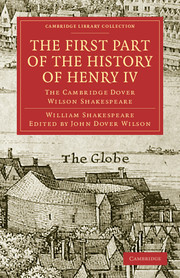THE COPY FOR THE TEXTS OF 1598 AND 1623
Published online by Cambridge University Press: 07 September 2010
Summary
The Q text
The text of 1 Henry IV presents few problems of a general character, and they may be briefly dealt with. Copy for the play was entered in the Stationers' Register on 25 February 1598 by the publisher Andrew Wise, and was printed by Peter Short, doubtless soon after. We can in fact trace two issues in 1598, the extant Q1 and an earlier quarto, of which all that is known is a single sheet, sig. C, that turned up in the binding of an Italian grammar found at Bristol in 1891. This sheet of an otherwise lost quarto, now labelled Qo, furnishes only one variant of any importance (2. 2.109); but it demonstrates that in reprinting Qo as Q1 the printer was trying to save paper, and for this purpose resorted to various devices, such as the dovetailing of speeches. This, for instance, is how he saves a line at 3. 2. 92–4:
Prin. I shall hereafter my thrice gratious Lord,
Be more my selfe. King. For all the world,
As thou art to this houre was Richard then.
And the economy, as is not surprising, has led to a misplacement of a speech-heading at 1. 1. 75–7, which lines Q1 (and F.) prints thus:
A gallant prize? Ha coosen, is it not? In faith it is. West. A conquest for a Prince to boast of.
And, seeing that 1 Henry IV Q i is one of the cleanest and best printed of all Shakespearian quartos, we may suspect that there was tidying up as well as tightening up at the time of reprinting.
- Type
- Chapter
- Information
- The First Part of the History of Henry IVThe Cambridge Dover Wilson Shakespeare, pp. 103 - 108Publisher: Cambridge University PressPrint publication year: 2009First published in: 1946

